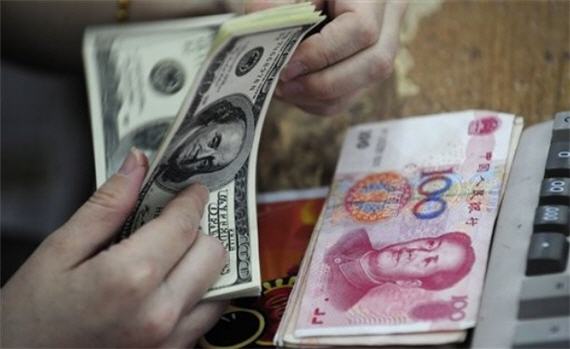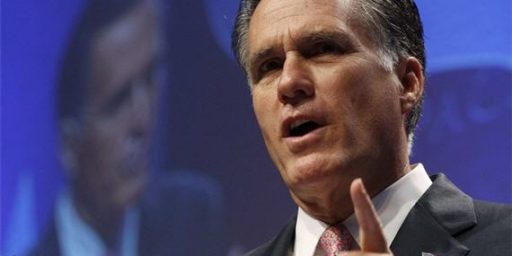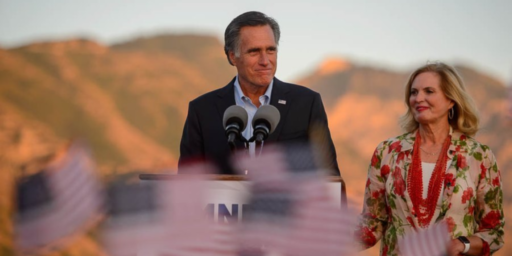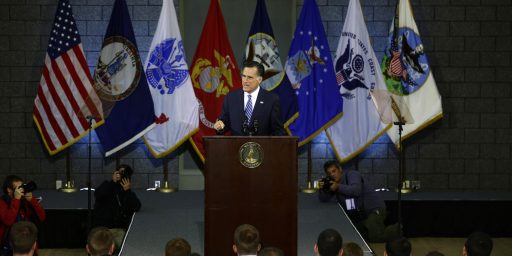Why Pick On China?
One of the aspects of Mitt Romney’s stated foreign policy positions that I find most distressing is his overemphasis on China. Here’s an example of what I mean:
During the second of three debates Tuesday ahead of the U.S. presidential election next month, Mr. Romney lashed out at Mr. Obama and repeated his previous pledge to label China as a currency manipulator, adding that he might introduce punitive tariffs on imports of Chinese goods.
“China has been a currency manipulator for years and years and years,” Mr. Romney said. “And the president has a regular opportunity to label them as a currency manipulator but refuses to do so. On day one, I will label China a currency manipulator, which will allow me as president to be able to put in place, if necessary, tariffs where I believe that they are taking unfair advantage of our manufacturers.”
This is not to say that there is no problem. As I see it the problem is in singling China out. Our problem isn’t China but currency manipulation and China is not the only culprit. In an incisive article in the Financial Times, Fred Bergsten and Joseph Gagnon observe:
China is by far the largest currency aggressor but has not been the major perpetrator of late. Three distinct groups are now involved. First are other Asian countries, including Japan, Singapore, Taiwan, Korea, Hong Kong, Thailand and Malaysia. Second are major oil exporters including the United Arab Emirates, Russia, Norway, Saudi Arabia, Kuwait and Algeria. Third are rich countries near to the eurozone, most notably Switzerland but also Denmark and Israel. If Mitt Romney is elected US president, he will be able to label many countries as currency manipulators on his first day in the Oval Office, not just China, as he has promised.
The result of holding large quantities of U. S. currency (and Treasuries) is in effect to export unemployment from the country holding the currency to the issuer of the currency. If China, Japan, Korea, and the other countries mentioned were purchasing U. S. goods and services with the currency they receive for the goods we import from them, it would produce jobs here. Holding currency avoids that. The benefits of trade accrue disproportionately to our government and financial sectors at the expense of the others. It is one of the reasons unemployment is so persistently high.
There are responses we could and should make:
What can be done? The rules of both the International Monetary Fund and World Trade Organization forbid currency manipulation to maintain trade surpluses. These should be implemented at long last. Brazil has taken initiatives to this end and many other developing countries that run trade deficits, and lose from the currency wars, should join. The US and the eurozone should lead the effort. New bilateral and regional trade agreements, such as the Trans-Pacific Partnership, should include such rules.
If the preferred multilateral remedies continue to fail, revealing a huge gap in the international economic architecture, the aggrieved countries should act together to induce currency aggressors to mend their ways. The most direct action would be countervailing currency intervention through which the US Federal Reserve and the European Central Bank buy foreign currencies to offset the exchange rate impact of others’ aggression. Another option would be a surcharge on imports from currency aggressors, as adopted unilaterally by the US in 1971. A third approach would be to impose a transactions tax or a withholding tax on US and European assets accumulated by the aggressors. Given the huge costs of currency aggression, such measures may become necessary to resolve this global systemic problem and allow recovery in the US and Europe.
That’s precisely what we need to do. But we should do so in an evenhanded manner. Singling out China because it is China is not only unfair. It would be ineffective.







Because it’s politically popular to pick on China.
It’s the same reason that the Obama campaign has been running ads in Ohio about Romney sending jobs to China while he was at Bain (a not entirely true claim, but this is politics where the facts are made up and the truth doesn’t matter).
Republicans need a world class enemy.
Those escalating requests for more defense spending have to be based on something, you know.
“One of the aspects of Mitt Romney’s stated foreign policy positions that I find most distressing is his overemphasis on China.”
You should be either distressed or reassured that Romney almost certainly doesn’t believe a single thing he’s saying about China and wouldn’t do anything different than any other President on the issue. I mean, Romney is clearly a Palin-level boob on foreign policy, but he’s got to know how the business community and Wall Street would react if he actually tried to follow through on any of his China-bashing talk.
Mike
Romney is such a walking contradiction of past and present political positions that NOBODY knows what he’ll do if he’s elected President. The guy just like having the title, perks, and most important, the power of the Presidency. The actual doing of the job is just a mere detail.
I sort of give any nation the right to maintain their own currency, and I kind of disbelieve that any country can fight the market to set their currency at any unnatural level (too high or too low) for long.
Understanding China’s Trade Surplus
In the end, labor at $2/hour matters more, and drives Chinese trade balances. Even if you could push some radical change, to make Chinese labor costs $10/hour in US dollars, would you then move on to Cambodia, Vietnam and Indonesia?
I think it is a mistake to treat China as an enemy. A rival, perhaps but an enemy no. We are so tied economically that any serious disruption in that relationship would not result in anything good. There was also some words on cyber and industrial espionage against us. China also engages in that but so do stalwart allies such as Israel and France.
We never hear about what kind of cyber espionage our friends at the NSA are doing to the Chinese. You have to be very naive to think that doesn’t happen, and what the Chinese think abot that.
As stonetools observes above, the GOP narrative demands a “Big Evil.” Without it they have no excuse for their manly strutting and chest-beating. China is the best they can do. What’s the alternative, Brazil?
@michael reynolds: Well, they keep waving a sheet printed “Iran! Scary Nukes! Boo!” in our faces but only the neocons seem to bark at that one…
It’s a base election and Romney is playing to the so-called “base.” Do you blame him? In an election finishing 2nd is finishing last.
FYI we most certainly do not need to engage in counter currency manipulation, as that quoted article suggests. That’s absurd. If we try to boost our own exports by debasing our own currency the untoward effect will be higher gas prices particularly and overall higher inflation. The hangover will hurt worse than the party felt good. Plus the Fed already is destroying our fiscal future by purchasing government bonds in perpetuity. Now you want them to add purchases of foreign currencies to the mix? Geez.
We also most certainly do not want import surcharges on the the likes of China and other currency manipulators. How exactly does that help U.S. consumers?
Transaction taxes are like tariffs and other anti-trade items. The negative ripple effects outweigh the nominal positive effects.
The way to deal with China is to compete with them. Lower corporate tax rates. Get rid of the junk lawsuit boondoggle. Accept that clean air and clean water standards from only 20 years ago are OK. Accept that caribou and salamanders are not more important than jobs.
Make China our partner. They have an insatiable demand for oil. If we unshackled our domestic oil industries we could become a rival to the Middle East. Cut a below spot deal with China for them to purchase oil that’s produced and refined here in the U.S. In exchange they have to purchase a minimum annual number of auto parts and diesel engines. So on, so forth. Keep your friends close and your (prospective) enemies even closer.
More taxes and regulations never are the answer to what at its core is a problem of too much taxes and too many regulations.
If only there was some expert on China that the Republicans could have nominated … or at least consulted on the issue …
Romney is talking to people who have an understanding of currency manipulation that is weak to put it mildly. These same people are very aware of the movement of jobs to China so concentrating on China makes sense to help people grasp the effects of currency manipulation.
I think talking crudely about exchange rates is better than avoiding the subject while reciting free trade platitudes which is what most politicians and economists do.
@Tsar Nicholas:
Will that beat $2/hour labor? How?
Basically the right has a superstition that dollars and cents don’t matter, feelings do. If companies feel good about regulation, they’ll pay more to work here. That is kind of contradictory.
@john personna:
That’s where the whining and the Uncertainty Fairy come into it. Republicans actually believe that if people say mean things about billionaires that a million people lose their jobs. It’s the economic theory known as, Waaaah! I understand it came out of the University of Wimp.
And really how can an entrepreneur, a risk-taker, a bold horizon-gazing, chin-jutting businessman possibly survive unless we guarantee him that the world will stay exactly as it is forever? Uncertainty is so scary!
@michael reynolds:
Lots of sixty-something millionaires are going to say they aren’t working “because Obama!” Of course, based on their age we might guess that they were working under much stricter tax regimes. That was actually when they made their nut.
If someone is golfing and complaining that he’s not working because of Obama … you might note the “golfing” part.
Could you expand on that? or point out a source for further reading? It makes some sense, but I’m not really getting it intuitively… and it seems to be a pretty critical point.
@c.red:
Against better judgment here we go….
Suppose we have 2 countries A and B. A exports X to B and gets $100. Via various policies (currency manipulations, tariffs, what have you) A keeps that $100 from being spent on buying Y from B. Thus the employment level in B is lower than it would be absent A’s policies to keep the $100 in A. If A further manipulates its currency so that it sells $150 of X, then employment will be even lower in B relative to a free trade situation while employment in A will be higher.
Note in this simple model that the solution is not to impose tariffs or to start currency manipulation in B. All that will do is drive down employment in A and deprive consumers in B of the product X (or reduce the supply of X and thereby increase the profits of domestic X producers in B who will then obtain those profits from consumers in B and also likely further reduce employment levels). The optimal solution is to have free trade.
@c.red:
And another factor, once the money is converted back to the currency in country A (since policies by A discourage buying Y from B) that money is spent on A further reducing unemployment.
Surely that cyber espionage works both ways…
Oh? We have the same or a similar amount of oil as the Middle East? How amazing…
@Steve Verdon:
It was meant as a serious question and thank you for the explanation. If I’m getting you correctly, it does not cause more unemployment, it just does not allow the US to expand (which given population growth is the same thing)?
I need to consider that scenario a bit, because how you present it seems to imply B has all the power in the relationship, they can always print off more money, and if there is no profit gouging for X then it could be basically given away… in which case there is no real need for employment…
@Steve Verdon:
One problem with export-import models is that they don’t consider government revenue change with outsourcing. I’ll use the same sort of “all else being equal story” to illustrate.
Two brothers, John and Bill own factories. John makes arrows and Bill makes bows. They each employ 100 people, paying them 40K per year. They pay corporate tax of course, but also real estate taxes, directly. That is only the top of the pyramid though. Each employee pays income taxes, and sales taxes, and if they own homes, their own property taxes. The 101 people at each company pay for all levels of US government.
Let’s say John decides that free trade is best, optimal, and so forth. He keeps 10 people to manage the front office, sells off his factory, lays off 90 workers, and contracts for delivery from China. Let’s say that increases his corporate income, and he pays himself and the 10 remaining workers a bit more.
That is what is sold as a market victory, but we can see that a significant amount of US tax revenue has been lopped off. 90 workers are no longer paying tax. Factories do not support local property tax, etc. etc.
Now the key thing is that tariff might be used to balance that. If you could think of the right number, then John and Bill could each support a similar share of US government. If you don’t do that though, if you just set tariff at zero (calling that free trade) all you do is encourage Bill to join his brother.
@Steve Verdon:
BTW, I think your explanation was good, but the advanced form, with a variable money supply is a bit trickier.
Actually, doesn’t it work this way?
China sells $2T in goods to the US, takes $1T of profit and buys US T-bills. The US says “ha, ha. Got ya” and creates another $1T. Since the $1T in Chinese savings is just sitting there, earning negative interest, it is not inflationary at all. Putting “$1T back” into the active economy just evens things up.
@c.red:
Well, in a sense you are “exporting” your unemployment since employment in B is lower than it otherwise would be, and your employment is higher (of course there is the famous, all other things equal/unchanging assumption).
It isn’t just the drain on the currency, but that the currency drain is not being “returned” as well. Printing more money might work, but it could just lead to higher overall prices since people wont be fooled by that “trick” for long.
@john personna:
Assuming they never ever find other employment again, that the factor is sold to somebody who uses it for nothing, ever, and so forth.
While your story does happen, the other side is that people and factories tend not to remain “fallow” for very long (usually). Of course what scares many people in the above situation is the increase in uncertainty. What will they make if not arrows (targets maybe, or how about the leather arm bad, or quivers, or crossbows, or….).
Reducing trade is not usually a road to economic prosperity. Your same argument can be made at the state level for example. If we assume Bill and John live in separate states, then John decides to relocate to reduce transportation costs and because the state Bill lives in throws him a nice tax break for the first 5 years. So why not let various states impose tariffs to “balance things out”? Because it would reduce overall level of trade and that is a way to make people worse of not better off. Promoting more trade is a good thing.
Why stop at $2 trillion/$1 trillion, why not double or triple it via U.S. policies then.
@Steve Verdon:
I think we agree in principle. I was certainly not proposing “protectionism,” but neither do I buy the argument that any non-zero tariff is protectionist nor unduly discriminatory.
I’m actually arguing that you need some small non-zero tariff for economic efficiency, to not unduly burden domestic workers.
(I’d truly love it if tax breaks for crony companies were outlawed. Nevada poaching California movie companies by taxing them less than casinos isn’t really in the long term good.)
On the trillions, obviously the end game matters. We could plot out horrific end games, but also some not terrible ones. The dream has always been that an affluent China would lead to wage parity and all would be well again. Maybe that’s at the optimistic end of end game dreams.
I mean, the definition of economic efficiency would be to have the same tax rate everywhere, globally, so as not to cause perturbation in market decisions. When someone moves an outlet mall across a border because they are promised a 5 year tax holiday, they didn’t make their decision based on comparative advantage in the real, original, sense.
lol, tax holidays are the worst form of comparative advantage. A pol’s corruption.